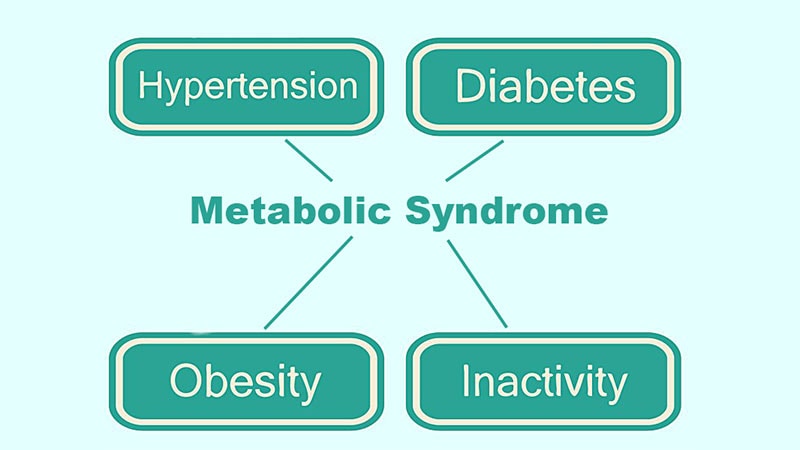Arterial Stiffness as a Cause of Metabolic Syndrome
Core Concepts
Arterial stiffness may be a primary cause of metabolic syndrome, especially in male teens, urging early intervention and monitoring.
Abstract
The study highlights the relationship between arterial stiffness and metabolic syndrome, emphasizing the importance of early detection and intervention. Here is a breakdown of the key points:
-
Arterial Stiffness Precedes Metabolic Syndrome:
- Arterial stiffness was found to occur before the onset of metabolic syndrome in a longitudinal study.
- A progressive increase in arterial stiffness was linked to a higher risk of developing metabolic syndrome over a 7-year period.
-
Sex Differences in Risk:
- Males had a significantly higher risk of metabolic syndrome due to arterial stiffness compared to females.
- The study suggests that arterial stiffness may independently cause metabolic syndrome in male teens.
-
Implications for Physicians:
- Early detection of arterial stiffness could serve as a marker for disease progression.
- Physicians are encouraged to consider arterial stiffness as a potential cause of metabolic syndrome and focus on preventive measures.
-
Preventive Measures:
- Lifestyle changes, physical activity, and dietary modifications can help reduce arterial stiffness.
- Regular monitoring of at-risk teens for arterial stiffness, lipid levels, blood pressure, and obesity is recommended.
-
Treatment Recommendations:
- Early intervention during adolescence is crucial to prevent the progression of metabolic syndrome.
- Treatment options include lifestyle changes, medications, and referrals to specialized clinics.
-
Research Funding and Conflicts of Interest:
- The study received funding from various foundations, with no reported conflicts of interest by the author.
Customize Summary
Rewrite with AI
Generate Citations
Translate Source
To Another Language
Generate MindMap
from source content
Visit Source
www.medscape.com
Stiff Arteries May Cause Metabolic Syndrome
Stats
Arterial stiffness may independently cause metabolic syndrome in 1 out of 10 male teens.
The overall risk for metabolic syndrome doubled within the 7-year study period.
Quotes
"It seems metabolic syndrome has a new risk factor we haven't thought about." - Andrew O. Agbaje
Key Insights Distilled From
by Brittany Var... at www.medscape.com 07-25-2023
https://www.medscape.com/viewarticle/994799
Deeper Inquiries
How can early detection of arterial stiffness impact the management of metabolic syndrome in adolescents?
Early detection of arterial stiffness can significantly impact the management of metabolic syndrome in adolescents by serving as a crucial marker for disease progression. Identifying arterial stiffness before the onset of metabolic syndrome allows for timely interventions to prevent the development of the condition. By monitoring arterial stiffness in at-risk teens, healthcare providers can implement targeted strategies such as lifestyle modifications, dietary changes, and physical activity to mitigate the risk factors associated with metabolic syndrome. Early detection also enables healthcare professionals to closely monitor the progression of the condition and adjust treatment plans accordingly, potentially preventing the long-term complications of metabolic syndrome.
What are the potential long-term consequences of untreated arterial stiffness in young populations?
Untreated arterial stiffness in young populations can lead to a cascade of adverse health outcomes and long-term consequences. Stiff arteries can disrupt blood flow to vital organs such as the liver and pancreas, affecting their function and potentially leading to insulin resistance and dyslipidemia. Over time, untreated arterial stiffness may contribute to the development of metabolic syndrome, increasing the risk of cardiovascular diseases, type 2 diabetes, and other chronic conditions. Additionally, arterial stiffness can result in elevated blood pressure, further exacerbating cardiovascular risk factors. If left untreated, arterial stiffness in young populations can progress to more severe cardiovascular complications and metabolic disorders, impacting overall health and quality of life.
How can the findings of this study influence public health policies regarding metabolic syndrome prevention?
The findings of this study can have significant implications for public health policies regarding metabolic syndrome prevention by highlighting the importance of addressing arterial stiffness as a potential causative factor. Public health initiatives can incorporate screening programs to detect arterial stiffness in adolescents as part of preventive healthcare measures. By raising awareness about the relationship between arterial stiffness and metabolic syndrome, policymakers can prioritize early intervention strategies aimed at reducing the burden of metabolic disorders in the population. Public health campaigns can emphasize the importance of lifestyle modifications, regular monitoring of cardiovascular health markers, and access to preventive care services for at-risk individuals. Integrating the findings of this study into public health policies can help in developing targeted interventions to prevent and manage metabolic syndrome effectively.
0
